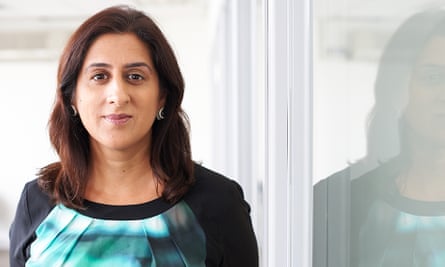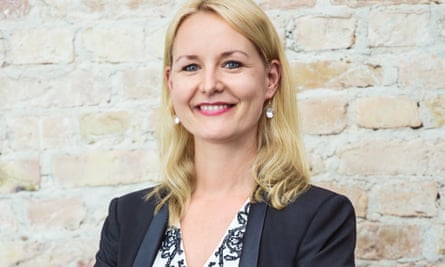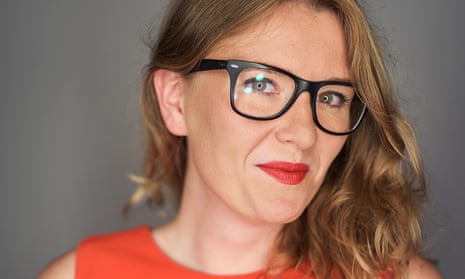When an 18-year-old Marta Krupinska was told by her bank and Western Union that they would charge her between €300 to €400 (£255 - £340) to send the €3,000 (£2,560) she had managed to save from waitressing in Ireland back to her mother in Poland, she was appalled.
“It was cheaper to get a plane ticket and stuff my pockets with cash,” she says. And, after asking her bulkiest friend to pick her up from the airport and protect her with all the cash she was carrying, that’s exactly what she did.
Several years later, she co-founded a fintech company called Azimo, a digital money transfer service for Europe’s migrants to send money anywhere in the world at much lower rates than the incumbents. For Krupinska, that’s what fintech is all about: using tech to solve a particular problem caused by the injustices of the finance sector.
But despite the hype around fintech’s ability to disrupt banking – making it more transparent, democratised and accessible – in terms of gender balance the industry largely mirrors its parent sectors, finance and technology.
“The number of times I’ve been asked if I’m somebody’s wife or somebody’s secretary, I unfortunately can’t count on one hand,” says Krupinska, one of Forbes’ 30 under 30 for finance in Europe. “I’d probably need at least three hands.”
‘Diversity is important when you’re redefining the status quo’
She’s not the only one to feel out of place. “Whenever you go to a fintech event, there’s never a line for the ladies,” says Monica Kalia, co-founder of Neyber, an alternative lender that gives employees from participating organisations access to affordable loans, with repayments taken directly from their payroll.

Kalia worked for Goldman Sachs around the time of the 2008 financial crisis. “Roll forward five years and while the banks had been stabilised and addressed their capital issues, people still weren’t able to access lending on fair terms,” she says. “We spotted an opportunity.”
For Neyber, diversity is crucial: they believe that if new products are to appeal to both men and women, they must be designed by both men and women. “Diversity in any business is important, but particularly in a new business where you’re trying to redefine the status quo,” says Kalia.
Unfortunately, much of the rest of the fintech world doesn’t seem to have cottoned on. The problem is that fintech founders tend to be “alpha males who have been successful investment bankers who want to do their own thing and they bring together a couple of their ex-colleagues”, Kalia explains.
“People typically hire people that look like them. You need change at the top,” she continues, pointing to an idea posed by former Google executive Sukhinder Singh Cassidy to put a woman on every startup company board.
‘A women could launch any fintech business in Nigeria and be successful’
But fintech companies can provide more opportunities for women than their competitors in finance. While both bestow hefty workloads on their employees, a startup can – particularly if you’re the one that set it up – provide a more flexible working environment, easing the burden on women with children.
More and more female bankers, meanwhile, are said to be fed up with the alpha male culture and sexist attitudes found in finance and are considering a switchto fintech.
Christine Duhaime, founder of the Digital Finance Institute, a global thinktank for fintech based in Canada, says fintech is more diverse than the financial services sector overall. “Many women around the world are in much better positions in fintech at banks, such as heads of innovation, than they would have been in traditional financial services positions,” she says.
Given that it’s a new and expanding sector, women in fintech have more opportunities to move up the career ladder, which can lead to “plum jobs in bigger, well-established banks”, Duhaime adds. “The old establishment is beginning to embrace innovation and is open minded to changes in banking culture, that was so very male-oriented for so many years.”
This is particularly true in emerging markets. “In Nigeria, for example, they literally need everything in fintech and are just getting going,” says Duhaime. “It’s a country of 170 million people who speak English and it’s the gateway to Africa. A woman could launch any fintech there and be successful if she works hard, whether she is Nigerian or British.”
‘It’s a challenge to find women to be company co-founders’
Elsewhere, however, change is happening at a slower pace. Innovate Finance, which represents the UK’s fintech community, put together a 2016 powerlist (pdf) of women in fintech. It showcases impressive female talent, but often in more traditionally female roles, such as marketing and PR, while only 21 of Innovate Finance’s 260 member companies have actually been founded by a woman.
Carolin Gabor, the only woman on the six-strong managing director team at FinLeap, a company builder specialising in fintech, spends much of her time recruiting entrepreneurs to launch FinLeap’s businesses. “There’s a growing number of women at junior level,” she says, “but it’s a challenge to find female entrepreneurs who want to build a company with us as co-founder or managing director.”

One of the biggest problems for women is attracting capital. Most venture capitalists are male, and they’ve tended to invest in male-owned businesses. According to the International Finance Corporation, there’s a global $300bn (£240bn) gap in financing for women-owned small businesses.
“Women are expected to be collegial and friendly and supportive and not too pushy,” says Krupinska. “Yet when you meet with an investor to pitch your business you want to come across as someone who is going to be ruthless in creating value. It’s very hard to navigate that fine line.”
Things are improving: Innovate Finance now has more funds dedicated to investing in women, and it supports Global Invest Her, a network to help female entrepreneurs demystify funding and find investment opportunities. Gabor, meanwhile, founded Fintech Ladies Europe in 2016, to help women network with each other.
‘It’s entirely inappropriate to have men coding our entire future’
But change needs to come from the bottom up, as well as top down. One of the five recommendations on the Innovate Finance manifesto to get more women in fintech is to make Stem (science, technology, engineering, maths) learning compulsory in schools and pair up female students with mentors.
With the world’s growing reliance on coders and artificial intelligence, Duhaime believes this is more important than ever. “It is entirely inappropriate to have men coding our entire future,” she says.
Part of the problem is that far fewer women take maths and computer science degrees. Ruben Kostucki, co-founder of Makers Academy, a 12-week intensive coding school that trains more than 350 people a year, has spent the last few years convincing employers that coders don’t need degrees.
“A lot of software developers are self-taught,” he says, adding that employers say they want to increase diversity, and that they know women don’t take computer science degrees, and yet they still include it as a prerequisite on a job description. “They do everything the way it has always been always done.”
Makers Academy partners with organisations such as Mums in Technology, and offers a discount to female applicants. “We know it’s not much,” says Kostucki. “No woman comes on the course because of a £500 discount. It is a statement.”
Many of its alumni have gone into fintech, including the woman who founded Brolly, which helps customers make informed decisions about their insurance. And, thanks in part to scholarships from Thoughtworks, the last Makers Academy cohort was 51% female.
Looking for a job? Browse Guardian Jobs or sign up to Guardian Careers for the latest job vacancies and career advice

Comments (…)
Sign in or create your Guardian account to join the discussion